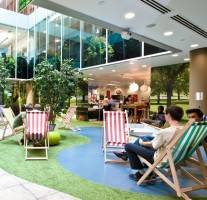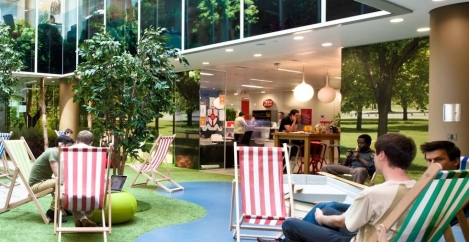May 29, 2015
London firms focus on wellbeing and agile working to attract staff
 An additional 5.1m sq. ft. of office space will be required by 2019 to accommodate the growth of professional services firms in London, claims new research from CBRE. According to the studio, firms will also adopt more pragmatic workplace strategies that focus on agile working and wellbeing to meet their objectives. Nearly all (92 percent) of the respondents to CBRE’s Professional London survey claim they use the workplace to enhance employee satisfaction and 83 percent of firms use it to control costs. Firms are also placing more emphasis on wellbeing and more agile and intensive ways of using space, according to CBRE. Other factors such as technology and the design of the workplace are also increasingly important. The research suggests that staff are increasingly attracted by on-site amenities, connectivity and location and other ‘lifestyle offerings’.
An additional 5.1m sq. ft. of office space will be required by 2019 to accommodate the growth of professional services firms in London, claims new research from CBRE. According to the studio, firms will also adopt more pragmatic workplace strategies that focus on agile working and wellbeing to meet their objectives. Nearly all (92 percent) of the respondents to CBRE’s Professional London survey claim they use the workplace to enhance employee satisfaction and 83 percent of firms use it to control costs. Firms are also placing more emphasis on wellbeing and more agile and intensive ways of using space, according to CBRE. Other factors such as technology and the design of the workplace are also increasingly important. The research suggests that staff are increasingly attracted by on-site amenities, connectivity and location and other ‘lifestyle offerings’.
Accountancy and management consultants currently allocate 1.25 people per desk as part of their flexible working arrangements; this is forecast to rise to between 1.5 and 1.75 in the next five years with agile working (including remote working) becoming commonplace.
The report also claims that firms increasingly require collaborative space to support agile working, with a greater proportion of a company’s space assigned to breakout areas and touchdown space. In addition firms will consider the use of small satellite touchdown offices in key locations for internal and client meetings.
For firms following this option, it will be accompanied by a re-location to a lower cost location providing a similar level of amenities. This strategy will go hand in hand with outsourcing – where the recent focus has been around ‘nearshoring’ in key UK regional cities.
Robin Wickham, executive director, Central London, CBRE commented: “The report highlights the very real tension between rising property costs, competition amongst firms to attract and retain the best talent, and employee satisfaction. Occupiers are under pressure to keep costs down and are continually exploring strategies to use space more efficiently.
“Whilst escalating costs are a key challenge facing occupiers, firms are using office space to attract staff with 92 percent of respondents citing employee satisfaction as a business driver shaping workplace strategy. A total of 55,500 new jobs in the professional services industries are expected by 2019, making the requirement of an effective property strategy even more prevalent, especially as the war for talent heats up.”
Wickham continued: “As well as attracting talent, evidence suggests that adoption of ‘wellness’ standards have a positive impact on employee productivity and business performance with 83 percent of respondents citing workspace strategy as a means of promoting employee effectiveness.
“However, offices will need to be used more efficiently whilst the allocation of desks per person is expected to decrease – increasingly the professional services sector is adopting hot-desking strategies to encourage collaborative working practices and space saving.”
John Kent, executive director, Central London, CBRE commented: “Professional services firms will require the appropriate investment in technology to facilitate this new style of working. Though the costs of adopting the required technology may well be a constraint for some, it should be considered as an essential investment – 82 percent of respondents stated that technology will be the key enabler to delivering greater collaboration and flexible working solutions whilst intending to increase visibility on social media platforms.”
Image: Google offices by Peldon Rose














